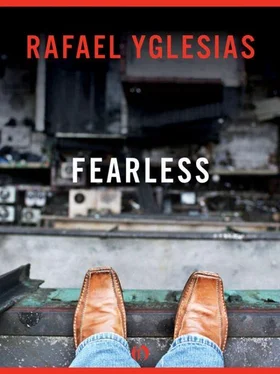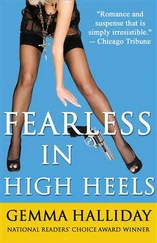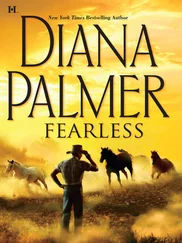Max relayed the advice to Betty. She seemed glad to have it. Her mouth set and she clenched her fists. “Okay. Great. Oh. Also there’s somebody from the Federal Aviation Administration who needs to interview you. He said—”
“Get rid of him. Tell the lawyers I’ve got a lawyer. Tell everybody else you don’t know where I am and take messages.”
Betty nodded seriously. “Right.” Her lips and cheeks were as plump and fresh as a child’s.
“Thank you,” Max said. “I’m sorry about all this.”
“Hey — no problem. It’s exciting,” she said and smiled. Her happiness was revealed only for a moment. She realized that it wasn’t polite and was embarrassed. “I’m sorry,” she mumbled.
“Don’t be, don’t apologize. You’ve got it,” Max said and encouraged her with applause. “Thank you. You understand. It’s terrible and it’s exciting.”
Betty backed out, flushed. “Okay,” she said. As she turned and left, Max indulged himself by admiring her beautifully thick and richly colored hair. He used to wonder if Jeff had hit on her; Jeff chatted and flirted with her every day. Max had disapproved. She’s almost young enough to be his daughter, he would think, and suggest Jeff get to work. What a prude I was, he decided. What a fool. I could have enjoyed that fresh cream instead of cleverly pitching Nutty Nick’s roof to create more storage. Maybe Jeff wasn’t irresponsible, lazy, cheap, and a petty thief. Maybe he was a man who knew that the sensual world was the only real one.
“Betty,” he called as she was about to disappear.
She returned eagerly. She had long black shorts on. They reached almost to her knees. Her legs were white, bleached when compared to her tanned face. She wore an oversized men’s T-shirt, tucked into the shorts, also black, but a lighter shade. Shoulder pads gave her a cocky attitude. Her bushy hair trailed behind, an abundant mass, a rope that could rescue him. Max gestured for her to come closer. “Hang on,” he said to Brillstein on the phone, who shot right back: “No problem.” Max got up from his chair as Betty came close. He stayed low at her level and kissed her on those young lips. It was a quick peck but long enough for a dozen sensations. Her lips were soft, of course, and a little wet. He also smelled cigarettes on her although he had thought she had given them up. “I’m sorry,” Max mumbled, inches from her surprised mouth. “But you’re pretty and sweet.”
Betty’s eyes lowered, her lids fluttering. Her eyes glistened. “I like you,” she said softly and then shook her head. “What am I saying?” she asked and stepped back.
“Thank you,” Max said. “I appreciate that you didn’t scold me.” He sank back into his chair. It rolled from the force and bumped him into the desk. He felt sore around his ribs. Was that from dodging the knife or jumping out of me plane? He picked up the receiver. Betty backed out, but she moved reluctantly. Max smiled at her. “You want me to sign stuff and see you,” he said to Brillstein on the phone. “Your office is clear, right? The press doesn’t know about you and me?”
“You mean that I’m representing the Good Samaritan?” Brillstein grunted. “You didn’t tell me everything,” he said in a lilting voice. Then he altered his tone to church-like solemnity. “What you did was impressive. Very brave. But that means we have a lot to discuss.”
“Don’t believe what you read — why?” Max interrupted himself, tired of denying his heroism. “Why does that mean we have a lot to discuss?”
“Well, I assume from the newspapers that you weren’t next to Mr. Gordon when he died.”
“That makes a difference?”
“It will to Mrs. Gordon. How Mr. Gordon felt at the end, and whether he knew what was happening to him, are compensable as pain and suffering.”
“Well, as you know now, he died instantly—”
“No, no. I mean, even before the crash. Each minute that you and Mr. Gordon believed you were going to die is worth dollars.” Brillstein lowered his voice and mumbled it again to himself, a prayer “Big dollars. Of course you’re alive and can testify to what you knew and felt. To Mrs. Gordon and her children, the question is whether you can—”
Max impatiently cut off his roundabout approach: “I was with Jeff until only seconds before the crash. I switched seats at the very end.”
“You were? So you do know how he felt while the plane was in trouble?”
“For Chrissake even if I weren’t sitting next to him I would know! He thought he was going to die. We all thought we were going to die. For twenty minutes we were—” Max laughed. “What was it Einstein said God didn’t do? He did it with us.”
Brillstein was stern. “I don’t know what you’re referring to, Mr. Klein.”
“He played dice with our universe. For twenty minutes we were all looking at the odds of whether we would live or die.”
“I’m not sure we’re communicating here. Do you know for a fact that Mr. Gordon believed he was going to die?”
“Of course. We discussed it. We discussed how Nan and the kids would make do.”
“You’re serious? Why didn’t you tell me yesterday!” Brillstein was thrilled. “Don’t say anything — wait. Let me turn on my recorder. We can do this now. Go ahead. Tell me everything from the moment you realized the plane was in trouble.”
Max heard the engines roar and felt the floor tremble against the insecure air. A beam of heated light traveled up his neck and bobbled from the shaky hydraulics. Jeff’s greyhound profile turned his way…
Max hung up. He couldn’t breathe. He heard his heart thumping, expanding in his chest, aching from inflation and effort. He was sweating, but not sweating hot, sweating in the cold air-conditioning, sweating fear. He was scared he was going to die, smashed flat on the ground, his head rolling on the burning carpet.
He ran out, ran out through the outer offices, trying to catch up to the fearless Max. He saw his employees’ faces startle as he passed. He banged out of the heavy metal door to the hallway.
He was cushioned by a block of hot air.
A cornstalk poked his face. He looked down at a little baby’s face, wondering blindly at the sky.
You’re alive .
Max ran down the wide fire stairs and his sweat was hot again, his pounding heart no longer too loud. He was growing bigger and stronger with each landing, getting free of his past, of their need to know everything was safe.
“Max!” His wife was waving a yellow umbrella as he jumped the final four steps to the lobby’s landing. She stood at the elevator surrounded by the tiny dirty white tiles of the marble floor, dressed in white, her long arms raised. The bright yellow circle wasn’t an umbrella. Debby was waving a plastic shopping bag to get his attention before he raced out the front doors.
“What!” he panted.
“I brought you clothes. What happened to your shirt? Where are you running? What’s wrong?”
“I’m closing the business!” he shouted, exasperated. “I hate this place!”
Debby allowed the yellow bag to drop by her side. As she moved toward him he was struck by her grace and beauty. Her long neck and straight back, acquired in adolescence as a ballet dancer and kept up by her teaching, floated at him in the stilled air. She had pulled her hair back, flush and sleek as a bathing cap. Her sympathetic light brown eyes were awash in tears. She seemed huge. Although she was an inch shorter and skinny as any starved middle-class New York woman, he shrank in her embrace.
“Please be okay. Please be with me.” Her lips kissed him on the cheek, on the eye, on the mouth, and she mumbled, “Come home with me, Max. I can’t make it without you. I need you.”
Читать дальше












